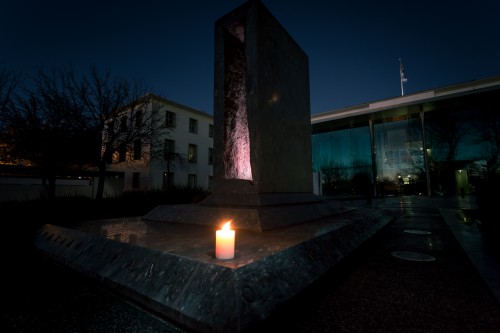5th August 2014
Australia remembers start of the Great War

Alongside Ambassadors and High Commissioners from many countries, representing both sides of the conflict, I took part yesterday in a moving ceremony to commemorate the 100th anniversary of the start of WW1, at Canberra’s Australian War Memorial. Meanwhile in Glasgow, Governor General Sir Peter Cosgrove, one of Australia’s most distinguished former soldiers, represented Australia at the Commonwealth commemoration service. All around the world our embassies turned off all their lights, save a single candle, reflecting then Foreign Secretary Sir Edward Grey’s remark at the outset of the war that “the lamps are going out all over Europe”.
In both Britain and Australia there has been an increase in the academic and public debate about the causes and conduct of the War in the run up to the centenary. Certainly a conflict that led to 16 million deaths and over 20 million wounded worldwide is not a cause for celebration. But it is an appropriate moment to reflect on the sacrifices made by so many of my grandparents’ generation. Indeed both my grandfathers served in that War.
The Gallipoli campaign, commemorated on Anzac Day, dominates Australian consciousness of the First World War. That’s understandable as, coming not long after Federation, it was the first time Australian soldiers were fighting under an Australian flag. They served with great distinction and have become a symbol of the Australian national character. More than 8,000 Australians died at Gallipoli. It was a tragic campaign for Britain too, with over 21,000 dead. And we should not forget that the Turks lost nearly 70,000. Over the next few years, the Australian government plans to raise the public profile of Australia’s engagement on the Western Front too. Battles like Pozières, Bullecourt and Villers-Bretonneux took a heavy human toll, but were ultimately successful steps on the route to victory.
Some question now why young Australians in 1914-18 travelled to the other side of the world to fight in a “European” war. There was no consensus for conscription, but huge numbers volunteered to participate. Most Australians at the time, including my grandfather’s brother, who had emigrated to Queensland a few years before but went back to fight, did not see it as someone else’s war. Predominantly of British heritage then, their views were summed up by Andrew Fisher who became Prime Minister a month after the outbreak of the war, when he pledged to defend the then mother country “to our last man and our last shilling”. Australia is a very different country today, with a more diverse demographic and cultural make-up. So is Britain. But, as the last 100 years have regularly demonstrated, we remain staunch friends and allies through thick and thin.
